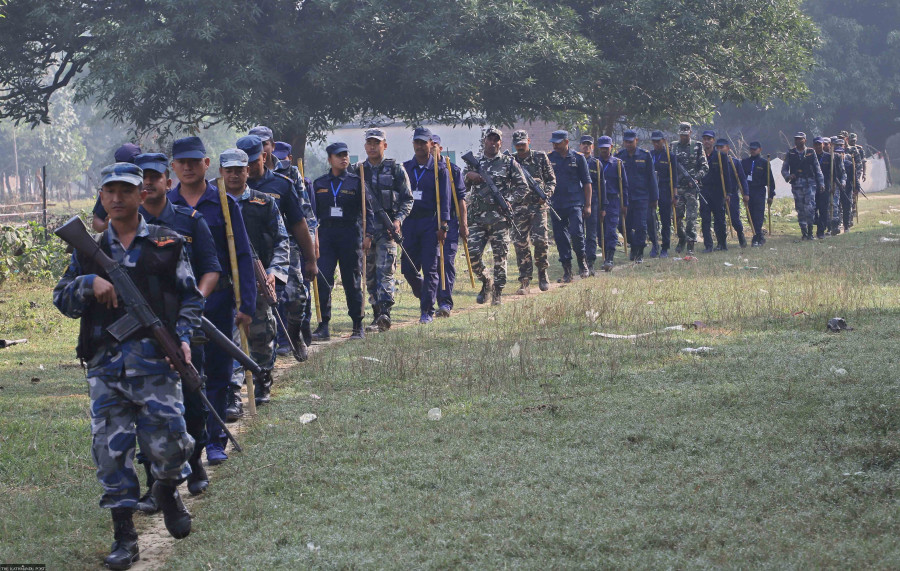National
Government geared to address security threats during election
Home Secretary Binod Prakash Singh said district administration offices have seized 2,025 small arms to minimise the security threat.
Tika R Pradhan
Amid sporadic incidents of explosion, the Home Ministry is geared to address any threat to Sunday’s federal and provincial polls being held in a single phase across the country.
Home Secretary Binod Prakash Singh said at a press conference on Friday that the government has made all the arrangements necessary to ensure the security of voters, candidates and polling materials.
However, Singh could not say clearly how the government would ensure the safety of all those involved in the polls. He only stressed that the administration would have zero tolerance for the forces boycotting the polls, if they caused any disturbances.
“We have decided to employ a zero tolerance policy towards those involved in disruptive activities,” said Singh. “We will book them. Some of them are already booked.”
Singh also said that the security forces have intensified the monitoring of individuals and groups who previously declared to boycott the polls.
Inspector General of Nepal Police Dhiraj Pratap Singh, Inspector General of Armed Police Force Raju Aryal, Head of the National Investigation Department Hutaraj Thapa and Lieutenant General of Nepali Army Saroj Pratap Rana were also present at the news conference.
Singh said the district administration offices have seized 2,025 small arms– 1,854 legal and 171 illegal, citing them as potential threats during the polls.
Despite suggestions from experts that the security arrangements could be challenging, the Election Commission pushed for single-phase polls.
All the security bodies involved in ensuring the security of the Sunday polls are under intense pressure after incidents of explosions were reported in different parts of the country.
“We have 903 bomb disposal teams on standby, focusing on the polling stations throughout the country,” said Singh. “That could increase to 1,050, if needed.”
Singh said the government has devised pre-election, election and post-election strategies as per the House of Representatives and provincial assembly election special security plan-2022.
Due to a lack of proper security arrangements during the May 13 polls, the Election Commission was compelled to go for re-polling at Budhiganda Municipality in Bajura.
The commission has allocated 10,892 polling stations, 22,227 polling centres and 141 temporary polling centres, deploying 246,960 returning officers for 17,988,570 voters this time.
The government has deployed a total of 298,579 security personnel for Sunday’s polls, which includes 74,849 Nepal Army, 71,693 Nepal Police and 35,116 Armed Police Force personnel, besides 1,921 members of the National Investigation Department and 115,000 temporary police.
Security experts, however, say the temporary police recruited for a period of two months are of no use at critical times, as they are not trained.
“Actually, we don’t have enough security strength for single-phase voting as the forces have not increased to the proportion of population and voter number growths,” said Ganesh Adhikari, a former chief of the National Investigation Department.
Adhikari said security arrangements would be blamed if anything ‘uncontrollable’ and unexpected happened during the election.
“Netra Bikram Chand could create some problems to show his party’s presence, but he may not be a serious threat to the polls,” Adhikari told the Post.
According to Singh, helicopters of Nepal Army are on standby at Surkhet, Pokhara, Bardibas and Itahari for deployment to any part of the country within half an hour if necessary. Besides, choppers of the private sector were also instructed to remain on standby.
Around two dozen forces, including the Communist Party of Nepal led by Netra Bikram Chand, the CPN (Bahumat) led by Dharmendra Bastola, the CPN (Revolutionary Maoist) led by Mohan Baidya, the Baigyanik Samajbadi Party led by Bishwo Bhakta Dulal; the Santa Bahadur Nepali-led CPN (Mashal)—a splinter of the Rastriya Janamorcha Party—and Rishi Kattel’s Nepal Communist Party are boycotting Sunday’s polls.
Around a third of the centres—3,080—are ‘very sensitive’ and 4,420 are sensitive, with the remaining being less sensitive in view of security.
“We have categorised the polling stations into three groups, based on the activities of the boycotting forces; ethnic, regional and communal groups; incidents that happened during previous polls; the open border and the remoteness of the stations,” the ministry stated.
According to Singh, three Nepal Police personnel and five temporary police recruits would be deployed to each polling station that is not sensitive, three Nepal Police and six temporary police personnel to sensitive stations and three Nepal Police and nine temporary police members to very sensitive polling stations. Two additional Nepal Police personnel and three temporary police would be deployed to the polling stations, if there is more than one polling centre.
Like the local polls, the government has failed to ensure the voting rights of Nepali citizens residing in Limpiyadhura and Lipulekh, which were incorporated into the country’s map in May 2020.




 18.12°C Kathmandu
18.12°C Kathmandu














